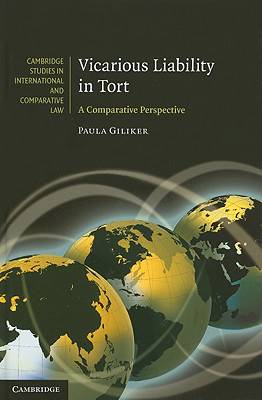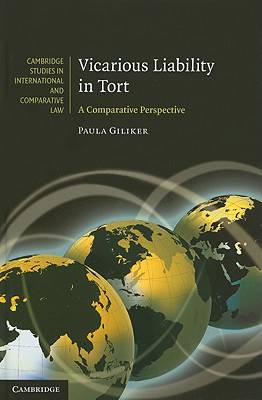
Je cadeautjes zeker op tijd in huis hebben voor de feestdagen? Kom langs in onze winkels en vind het perfecte geschenk!
- Afhalen na 1 uur in een winkel met voorraad
- Gratis thuislevering in België vanaf € 30
- Ruim aanbod met 7 miljoen producten
Je cadeautjes zeker op tijd in huis hebben voor de feestdagen? Kom langs in onze winkels en vind het perfecte geschenk!
- Afhalen na 1 uur in een winkel met voorraad
- Gratis thuislevering in België vanaf € 30
- Ruim aanbod met 7 miljoen producten
Zoeken
€ 198,95
+ 397 punten
Uitvoering
Omschrijving
Vicarious liability is controversial: a principle of strict liability in an area dominated by fault-based liability. By making an innocent party pay compensation for the torts of another, it can also appear unjust. Yet it is a principle found in all Western legal systems, be they civil law or common law. Despite uncertainty as to its justifications, it is accepted as necessary. In our modern global economy, we are unlikely to understand its meaning and rationale through study of one legal system alone. Using her considerable experience as a comparative tort lawyer, Paula Giliker examines the principle of vicarious liability (or, to a civil lawyer, liability for the acts of others) in England and Wales, Australia, Canada, France and Germany, and with reference to legal systems in countries such as the United States, New Zealand and Spain.
Specificaties
Betrokkenen
- Auteur(s):
- Uitgeverij:
Inhoud
- Aantal bladzijden:
- 330
- Taal:
- Engels
- Reeks:
- Reeksnummer:
- nr. 69
Eigenschappen
- Productcode (EAN):
- 9780521763370
- Verschijningsdatum:
- 28/10/2010
- Uitvoering:
- Hardcover
- Formaat:
- Genaaid
- Afmetingen:
- 152 mm x 229 mm
- Gewicht:
- 639 g

Alleen bij Standaard Boekhandel
+ 397 punten op je klantenkaart van Standaard Boekhandel
Beoordelingen
We publiceren alleen reviews die voldoen aan de voorwaarden voor reviews. Bekijk onze voorwaarden voor reviews.









